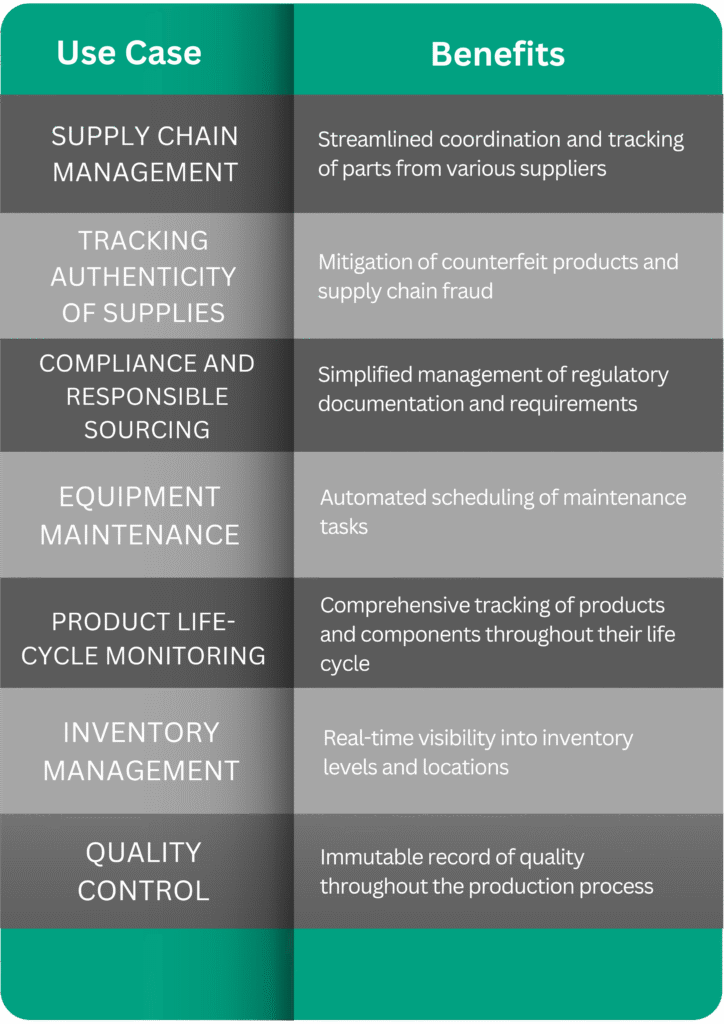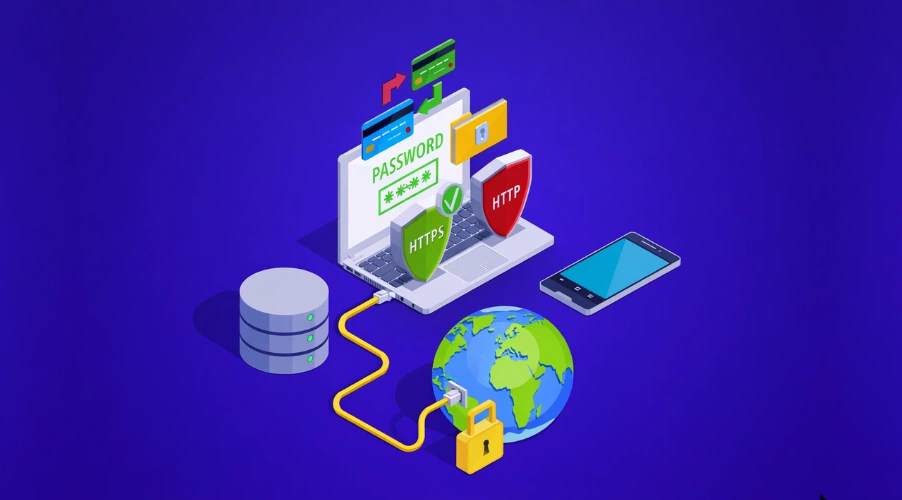Blockchain Impact often associated primarily with cryptocurrencies like Bitcoin, is increasingly making waves across various industries, including manufacturing. In this sector, companies are partnering with Blockchain Development Company like Nadcab Labs to enhance supply chain management, streamline compliance tracking, optimize maintenance processes, and efficiently manage inventory, among other applications. By harnessing blockchain’s capabilities, businesses can streamline their operations, gain greater transparency into their supply chains, and foster trusted interactions within their ecosystem. Below, we’ll explore the significant advantages of blockchain in manufacturing and examine how companies are implementing this technology to drive innovation and efficiency.
Key Takeaways:
-
Blockchain simplifies complexity in manufacturing industries by offering a distributed, tamper-proof ledger of transactions.
-
It provides a secure and immutable record of all transactions among users, ensuring transparency and trust.
-
Manufacturers can leverage blockchain to streamline operations, enhance supply chain visibility, and optimize asset management.
-
Trusted supply chain interactions among manufacturers and their partners are facilitated, improving collaboration and efficiency.
-
Key use cases include documenting compliance, preventing counterfeiting, tracking sustainability efforts, and automating machinery maintenance.
Innovative Solutions for Every Project
Blockchain in Manufacturing Explained:
Blockchain technology offers manufacturers the opportunity to simplify complex operations, enhance supply chain visibility, and achieve precise asset tracking. According to PwC, approximately 24% of industrial manufacturing CEOs are either exploring or implementing blockchain solutions.
In the manufacturing process, products often entail the assembly of numerous parts from various suppliers. Blockchain can revolutionize this process by enabling manufacturers to monitor each component’s journey from procurement through production and beyond. For instance, in the automotive industry, where cars comprise thousands of components sourced from numerous suppliers, ensuring reliability and safety is paramount. However, in cases of product recalls, identifying and replacing faulty parts becomes crucial.
Utilizing a private blockchain within the automotive sector, manufacturers can meticulously track component information across all suppliers. As vendors dispatch components, pertinent details are recorded as blockchain transactions. This information continues to evolve as components undergo inspection and integration into vehicles. In the event of an issue, manufacturers can swiftly pinpoint the source of the problematic part, identify affected vehicles, and trace the component’s entire manufacturing journey. By integrating pipe fabrication software, they gain enhanced visibility and control over the fabrication process, allowing them to address and rectify issues with heightened efficiency and accuracy. Consequently, manufacturers can address and rectify issues with heightened efficiency and accuracy.
Use Cases:

Benefits of Blockchain in Manufacturing
Blockchain technology offers numerous advantages across various sectors, with manufacturing being no exception. In this industry, it streamlines processes by enhancing operational transparency, speed, efficiency and trust among stakeholders. Take, for instance, the implementation of a blockchain platform to monitor interactions between manufacturers, suppliers, and other partners. Through proper authorization, manufacturers gain instant insights into transactions with suppliers and a comprehensive history of their collaborations. For instance, Hindalco Industries, based in India, adopted blockchain to manage work-order progress among its contract suppliers. This system enables real-time visibility into vendor inventory, facilitates for secure asset transfers, ensures SLA adherence via smart contracts, verifies product authenticity, supports seamless audits, and enables invoice financing. facilitates for secure asset transfers, ensures SLA adherence via smart contracts, verifies product authenticity, supports seamless audits, and enables invoice financing. facilitates Custom Exchange Development for secure asset transfers, ensures SLA adherence via smart contracts, verifies product authenticity, supports seamless audits, and enables invoice financing.
Manufacturing Potential – 5 Ways Nadcab Labs Leverages Blockchain
Unparalleled Traceability:
Nadcab Labs implements blockchain to meticulously document every facet of component transactions, forging an exhaustive audit trail.
Seamless Inventory Management:
With Nadcab Labs blockchain solutions, manual errors in inventory tracking become relics of the past.
Fortified Data Security:
Nadcab Labs blockchain architecture sets new standards for data integrity and security. Each transaction undergoes rigorous multi-party verification, rendering the data virtually impervious to tampering.
Effortless Payment Automation:
Through smart contracts, Nadcab Labs orchestrates seamless payment execution upon fulfilment of predetermined conditions.
Empowered HR Management:
Nadcab Labs harnesses blockchain to streamline labour-intensive HR operations. By tracking work hours and compensations with precision, Nadcab labs blockchain facilitates transparent and equitable workforce management.
Impact of Blockchain Technology Across Various Manufacturing Industries
-
Supply Chain Management
Blockchain technology has transformed Supply Chain Development and management by providing a decentralized, transparent, and tamper-proof ledger system. Its impact includes:
-
Enhanced Transparency:
All stakeholders in the supply chain can access real-time data, ensuring transparency and trust.
-
Improved Traceability:
Blockchain enables the tracking of goods from production to delivery, reducing counterfeiting and ensuring authenticity.
-
Streamlined Processes:
Smart contracts automate transactions and enforce agreements, reducing administrative overhead and errors.
-
Increased Efficiency:
Blockchain streamlines documentation and reduces delays, leading to faster and more efficient supply chain operations.
-
Reduced Costs:
By eliminating intermediaries and reducing the risk of fraud, blockchain lowers transaction costs and improves overall cost efficiency.
-
-
Banking
Blockchain technology is disrupting the banking sector by offering secure, decentralized, and efficient solutions. Its impact includes:
-
Faster Transactions:
Blockchain enables near-instantaneous cross-border transactions, reducing settlement times from days to minutes.
-
Enhanced Security:
The immutable nature of blockchain ensures that transactions are tamper-proof and secure, reducing the risk of fraud and cyberattacks.
-
Lower Costs:
By eliminating intermediaries and streamlining processes, blockchain reduces transaction fees and operational costs.
-
Improved Access:
Blockchain enables financial inclusion by providing access to banking services for the unbanked and underbanked populations.
-
Innovation Opportunities
Blockchain opens up new opportunities for innovation in areas such as peer-to-peer lending, remittances, and asset tokenization.
-
-
Cybersecurity
Blockchain technology is revolutionizing cybersecurity by providing decentralized, transparent, and tamper-proof solutions. Its impact includes:
-
Immutable Records:
Blockchain creates a tamper-proof ledger of transactions, making it difficult for hackers to alter or manipulate data.
-
Enhanced Data Privacy:
Blockchain encrypts data and provides users with greater control over their personal information, reducing the risk of data breaches.
-
Decentralization:
By distributing data across a network of nodes, blockchain reduces the risk of a single point of failure and enhances system resilience.
-
Increased Efficiency:
Blockchain enables secure and decentralized identity management, reducing the risk of identity theft and fraud.
-
Smart Contract Security:
Blockchain-based smart contracts automate and enforce agreements, reducing the risk of contract tampering or disputes.
-
-
Energy Efficiency
Blockchain technology is driving energy efficiency by enabling decentralized, transparent, and secure energy management solutions. Its impact includes:
-
Peer-to-Peer Energy Trading:
Blockchain enables individuals and businesses to buy and sell excess renewable energy directly through P2P Exchange , reducing reliance on centralized energy providers.
-
Supply Chain Transparency:
Blockchain enables transparent tracking of energy production and distribution, ensuring that energy comes from sustainable and renewable sources.
-
Demand Response Management:
Blockchain-based smart grids can automatically adjust energy consumption based on supply and demand, optimizing energy usage and reducing waste.
-
Carbon Credits Trading:
Blockchain facilitates transparent and secure trading of carbon credits, incentivizing businesses to reduce their carbon footprint.
-
Energy Data Monetization:
Blockchain enables individuals to monetize their energy usage data, creating new revenue streams and encouraging energy conservation.
-
-
Healthcare
Blockchain technology is revolutionizing healthcare by providing secure, transparent, and interoperable solutions. Its impact includes:
-
Secure Health Data Sharing:
Blockchain enables secure and transparent sharing of health data between patients, healthcare providers, and researchers, improving care coordination and patient outcomes.
-
Interoperability:
Blockchain enables interoperability between disparate healthcare systems, reducing data silos and improving data accuracy and completeness.
-
Patient Empowerment:
Blockchain gives patients greater control over their health data, allowing them to securely share it with healthcare providers and researchers as needed.
-
Drug Traceability:
Blockchain enables transparent tracking of pharmaceuticals from production to distribution, reducing the risk of counterfeit drugs and improving patient safety.
-
Clinical Trials:
Blockchain facilitates transparent and secure management of clinical trial data, reducing fraud and improving the integrity of research results.
-
-
Automotive
Blockchain technology is transforming the automotive industry by providing secure, transparent, and efficient solutions. Its impact includes:
-
Supply Chain Management:
Blockchain enables transparent tracking of automotive parts and components from production to assembly, reducing the risk of counterfeit parts and improving quality control.
-
Vehicle Identity:
Blockchain enables interoperability between disparate healthcare systems, reducing data silos and improving data accuracy and completeness.
-
Autonomous Vehicles:
Blockchain gives patients greater control over their health data, allowing them to securely share it with healthcare providers and researchers as needed.
-
Mobility Services:
Blockchain enables transparent and secure peer-to-peer car sharing and ride-hailing services, reducing reliance on centralized intermediaries.
-
Automotive Financing
Blockchain facilitates transparent and secure financing of vehicle purchases, reducing the risk of fraud and improving access to financing for consumers.
-
-
Government
Blockchain technology is transforming government services by providing transparent, secure, and efficient solutions. Its impact includes:
-
Transparent Elections:
Blockchain enables secure and transparent voting systems, reducing the risk of voter fraud and ensuring the integrity of elections.
-
Identity Management:
Blockchain enables secure and decentralized identity management, reducing the risk of identity theft and fraud in government services.
-
Land Registry
Blockchain enables transparent and tamper-proof land registries, reducing disputes over property ownership and increasing trust in government institutions.
-
Supply Chain Management:
Blockchain enables transparent tracking of government procurement processes, reducing corruption and increasing accountability.
-
Smart Contracts:
Blockchain-based smart contracts automate and enforce agreements in government contracts, reducing administrative overhead and improving efficiency.
-
-
Entertainment
Blockchain technology is disrupting the entertainment industry by providing transparent, secure, and decentralized solutions. Its impact includes:
-
Royalty Payments:
Blockchain enables transparent and automatic royalty payments to content creators, reducing the risk of piracy and ensuring fair compensation.
-
Content Distribution:
Blockchain facilitates transparent and direct distribution of content between creators and consumers, reducing the role of intermediaries and improving revenue distribution.
-
Intellectual Property Protection:
Blockchain enables secure and tamper-proof registration of intellectual property rights, reducing the risk of copyright infringement and piracy.
-
Fan Engagement:
Blockchain enables transparent and verifiable fan engagement through tokenization and smart contracts, creating new revenue streams for artists and creators.
-
Ticketing:
Blockchain enables transparent and secure ticketing systems, reducing the risk of fraud and scalping and improving access to live events for fans.
-
-
Regulatory Compliance
Blockchain technology is revolutionizing regulatory compliance by providing transparent, secure, and immutable solutions. Its impact includes:
-
Transparent Audit Trails:
Blockchain creates tamper-proof audit trails of regulatory compliance activities, reducing the risk of fraud and improving transparency.
-
Regulatory Reporting:
Blockchain enables transparent and efficient regulatory reporting, reducing the administrative burden on businesses and regulators.
-
Data Integrity:
Blockchain ensures the integrity and accuracy of regulatory data, reducing the risk of errors and discrepancies in compliance reporting.
-
Automated Compliance:
Blockchain-based Smart Contract Development automates and enforces regulatory compliance requirements, reducing the risk of non-compliance and penalties.
-
Cross-Border Compliance
Blockchain enables transparent and interoperable compliance across jurisdictions, reducing the complexity of global regulatory frameworks.
-
-
Transportation and Mobility
Blockchain Technology is transforming transportation and mobility by providing transparent, secure, and decentralized solutions. Its impact includes:
-
Supply Chain Management:
Blockchain enables transparent tracking of goods and shipments across transportation networks, reducing delays and improving efficiency.
-
Vehicle Identity:
Blockchain enables secure and tamper-proof vehicle identity management, reducing the risk of vehicle theft and fraud.
-
Mobility Services:
Blockchain facilitates transparent and secure peer-to-peer car sharing and ride-hailing services, reducing reliance on centralized intermediaries.
-
Smart Cities:
Blockchain enables secure and transparent data sharing between vehicles and infrastructure, improving traffic management and reducing congestion.
-
Sustainable Transportation:
Blockchain facilitates transparent tracking of carbon emissions from transportation activities, incentivizing the adoption of sustainable transportation modes.
Conclusion
In Conclusion, Nadcab Labs is revolutionizing manufacturing through blockchain technology. Their solutions offer unparalleled traceability, fortified data security, seamless inventory management, effortless payment automation, and empowered HR management. Nadcab Labs is simplifying complexity and driving efficiency in the manufacturing industry.
Author Profile
Nadcab Labs – A Leading Blockchain Developers With over 8+ years of experience in, Custom Blockchain Development, Smart Contract Development, Crypto Exchange Development, Token Creation and Many More Services.
-
Reviewed & Edited By

Aman Vaths
Founder of Nadcab Labs
Aman Vaths is the Founder & CTO of Nadcab Labs, a global digital engineering company delivering enterprise-grade solutions across AI, Web3, Blockchain, Big Data, Cloud, Cybersecurity, and Modern Application Development. With deep technical leadership and product innovation experience, Aman has positioned Nadcab Labs as one of the most advanced engineering companies driving the next era of intelligent, secure, and scalable software systems. Under his leadership, Nadcab Labs has built 2,000+ global projects across sectors including fintech, banking, healthcare, real estate, logistics, gaming, manufacturing, and next-generation DePIN networks. Aman’s strength lies in architecting high-performance systems, end-to-end platform engineering, and designing enterprise solutions that operate at global scale.







